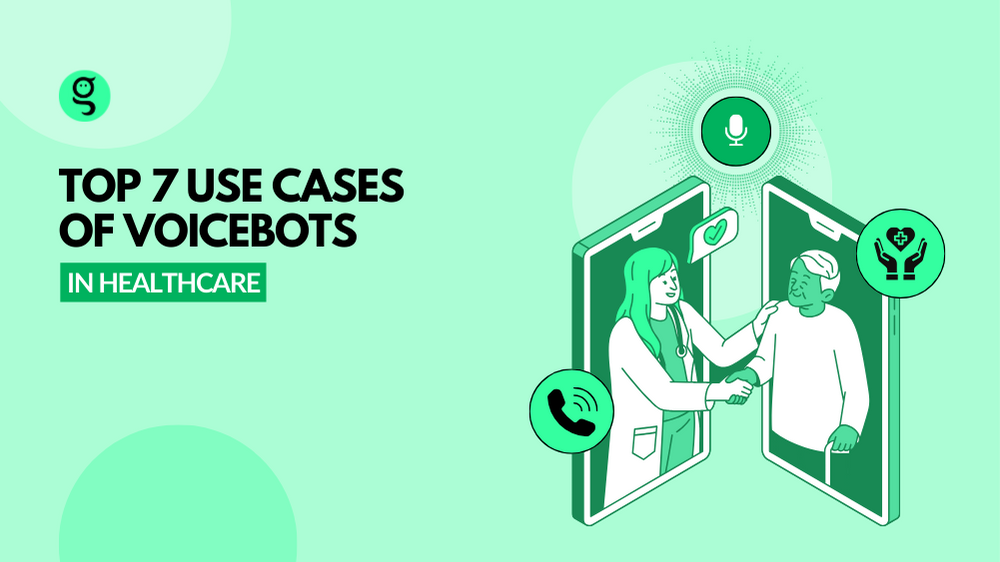Have you ever felt frustrated trying to schedule a doctor’s appointment or fill out repetitive medical paperwork? As a patient, dealing with administrative tasks can be tedious and time-consuming. And you as providers often struggle with inefficient systems and processes as well.
But what if we tell you that there is a solution? Enter healthcare voicebots. Powered by voice AI technology, voice bots are virtual assistants that can understand natural language, respond to complex questions, and handle key processes – all through natural conversations.
While voice bots are no substitute for the expertise and care of real physicians and hospital staff, they can reduce the burden of repetitive, high-volume tasks and enable providers to focus their energy where it really matters. Curious about how this works and how healthcare bots can help patients and you as care providers? We’ve got you covered.
Based on our experience in designing voice AI solutions for businesses in the healthcare sector here are the top 7 use cases where voice AI can be adopted to improve efficiency and offer better care to patients:
- FAQ Resolution
- Health Tracking & Management
- Appointment Scheduling
- Paperwork Automation & Assistance at Scale
- Timely Reminders
- Payment Collection
- Patient Engagement & Post-treatment Care
Top Use-Cases of Voice AI in Healthcare
1. FAQ Resolution:
We all have questions about health symptoms, diseases, or suggested treatments from time to time. But trying to call your clinic or even using confusing hospital websites leaves many questions unresolved or takes too much effort.
Healthcare bots, on the other hand, can address all types of routine patient questions accurately and instantly – be it clarifying billing details, medication instructions, or treatment side effects based on individual health history. This ensures patients stay reliably informed while reducing the FAQ resolution burden for hospital staff as well. Talk about a win-win.
2. Health Tracking & Management:
Managing chronic health conditions requires careful, long-term monitoring and reporting of vitals as well as symptoms between doctor visits. However, coordinating these patient reports across multiple channels like phone calls and hospital portals is challenging.
With a healthcare bot though, patients can conveniently provide quick voice updates on measured health factors like blood sugar levels, blood pressure, weight levels, and medication usage. These regular aggregates help care providers closely track health conditions and intervene earlier if needed. Way better than scrambling to pull health history before an appointment, right?
3. Appointment Scheduling:
.png?width=1000&height=562&name=Voice%20bot%20in%20Healthcare%20-%20Appointment%20Scheduling%20(Use%20Case).png)
Between playing phone tag with the clinic and negotiating complex calendar rules, simply scheduling medical appointments can frustrate patients.
Voice bots streamline this by checking real-time doctor availability while instantly booking appointments via conversational interfaces. Patients win with quick, efficient bookings while clinics and hospitals minimize appointment management overhead.
4. Paperwork Assistance & Automation at Scale:
The cringe is real when you’re handed a towering stack of medical history questionnaires or insurance claim forms, eh? Voice bots can rescue patients from paperwork agony by helping them complete digital forms through voice in minutes.
Healthcare providers also unlock benefits like digitized patient onboarding, automated discharge processes, and claims management at scale. Heck, they can even take care of routine paperwork like invoices and bills for outpatient services using secure voice interfaces. The result? Happier patients. Higher throughput and lower admin costs for hospitals.
5. Timely Reminders:
Missed a dose? Forgot your next doctor's visit? Such lapses are common yet worrisome if you have ongoing treatment plans. Luckily, voicebot reminders about everything from medicines to upcoming appointments and lab tests can hugely benefit patient compliance. No more pinning creased appointment cards on the fridge.
6. Payment Collection:
.png?width=1000&height=562&name=Voice%20bot%20in%20Healthcare%20-%20Payment%20Collection%20(Use%20Case).png)
The billing process is easily one of the most annoying interactions for both patients as well as healthcare providers. Clunky IVR payment systems coupled with convoluted medical billing codes rarely make for satisfactory experiences.
AI-powered voice assistants effortlessly bridge this gap by securely facilitating payment collection through simple conversational interfaces. The result? Faster payments. Lower collection costs. Happier stakeholders all around.
7. Patient Engagement & Post-Treatment Care:
A big yet often ignored opportunity lies in keeping patients engaged with their health beyond hospital visits through sustained coaching. Healthcare bots can regularly check in on patients through friendly voice chats to track progress, and medication adherence and offer healthcare tips for improved outcomes.
They can even alert physicians if additional interventions are needed. The value? Happier, healthier patients and lower hospital readmission rates.
To Conclude:
As a versatile technology applicable across the patient journey, voicebots drive convenience, efficiency, and better health outcomes. Now this is a winning combination in itself.
Ready to explore voice automation benefits for your healthcare organization? Book a personalized risk-free demo with VoiceGenie, our voice solution created specifically for customer-facing conversational applications. One conversation is all it takes to feel the human-like, multi-lingual magic. Don't wait, be an early voice AI adopter and unlock lasting competitive advantage.

Comments